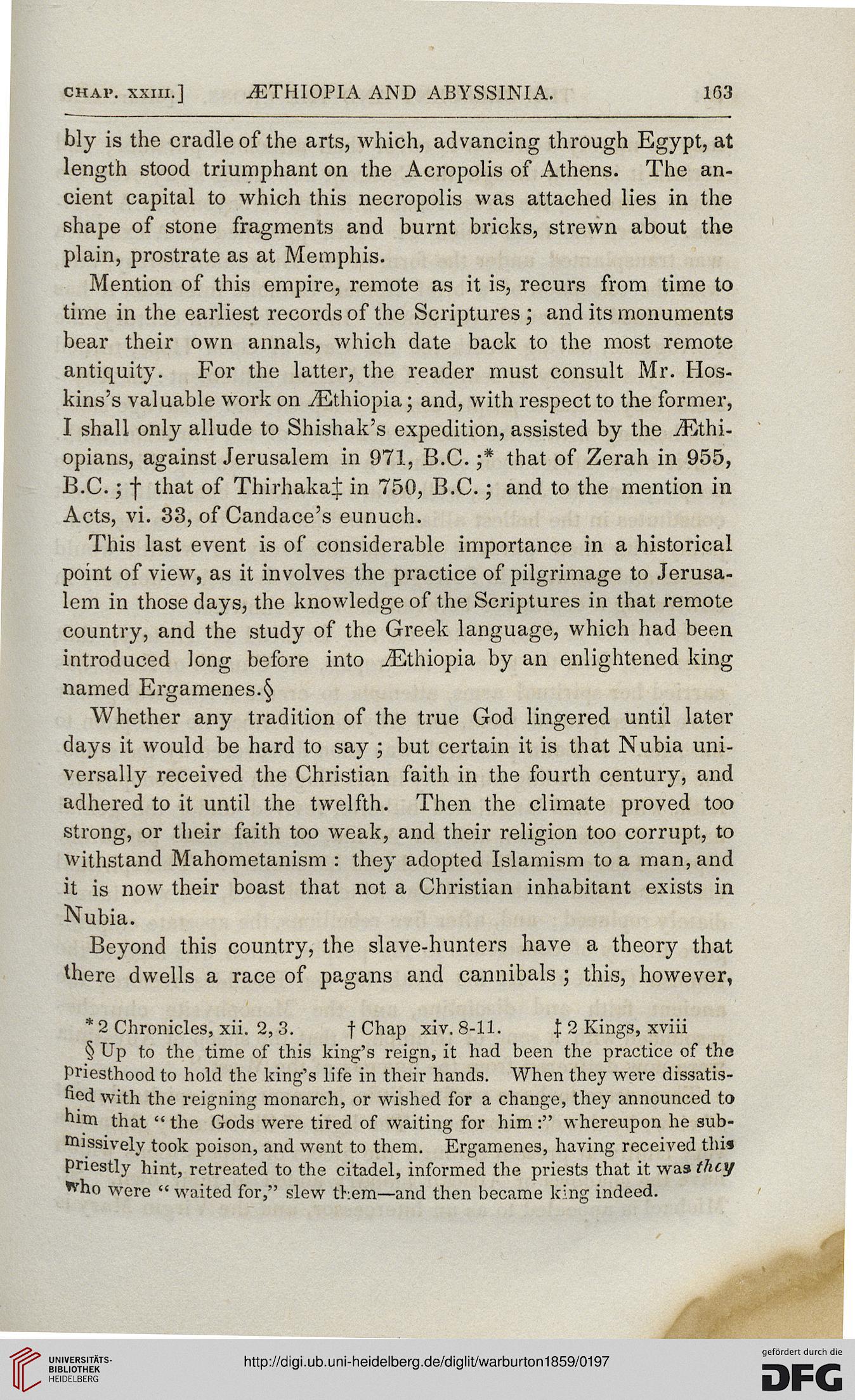chap, xxm.] ^ETHIOPIA AND ABYSSINIA.
1G3
bly is the cradle of the arts, which, advancing through Egypt, at
length stood triumphant on the Acropolis of Athens. The an-
cient capital to which this necropolis was attached lies in the
shape of stone fragments and burnt bricks, strewn about the
plain, prostrate as at Memphis.
Mention of this empire, remote as it is, recurs from time to
time in the earliest records of the Scriptures ; and its monuments
bear their own annals, which date back to the most remote
antiquity. For the latter, the reader must consult Mr. Hos-
kins's valuable work on ./Ethiopia; and, with respect to the former,
I shall only allude to Shishak's expedition, assisted by the iEthi-
opians, against Jerusalem in 971, B.C. ;* that of Zerah in 955,
B.C.; f that of Thirhakat in 750, B.C.; and to the mention in
Acts, vi. 33, of Candace's eunuch.
This last event is of considerable importance in a historical
point of view, as it involves the practice of pilgrimage to Jerusa-
lem in those days, the knowledge of the Scriptures in that remote
country, and the study of the Greek language, which had been
introduced long before into ^Ethiopia by an enlightened king
named Ergamenes.§
Whether any tradition of the true God lingered until later
days it would be hard to say ; but certain it is that Nubia uni-
versally received the Christian faith in the fourth century, and
adhered to it until the twelfth. Then the climate proved too
strong, or their faith too weak, and their religion too corrupt, to
withstand Mahometanism : they adopted Islamism to a man, and
it is now their boast that not a Christian inhabitant exists in
Nubia.
Beyond this country, the slave-hunters have a theory that
there dwells a race of pagans and cannibals ; this, however,
* 2 Chronicles, xii. 2, 3. f Chap xiv. 8-11. {2 Kings, xviii
§ Up to the time of this king's reign, it had been the practice of the
priesthood to hold the king's life in their hands. When they were dissatis-
fied with the reigning monarch, or wished for a change, they announced to
him that " the Gods were tired of waiting for him:" whereupon he sub-
missively took poison, and went to them. Ergamenes, having received this
priestly hint, retreated to the citadel, informed the priests that it was they
*'ho were " waited for," slew them—and then became king indeed.
1G3
bly is the cradle of the arts, which, advancing through Egypt, at
length stood triumphant on the Acropolis of Athens. The an-
cient capital to which this necropolis was attached lies in the
shape of stone fragments and burnt bricks, strewn about the
plain, prostrate as at Memphis.
Mention of this empire, remote as it is, recurs from time to
time in the earliest records of the Scriptures ; and its monuments
bear their own annals, which date back to the most remote
antiquity. For the latter, the reader must consult Mr. Hos-
kins's valuable work on ./Ethiopia; and, with respect to the former,
I shall only allude to Shishak's expedition, assisted by the iEthi-
opians, against Jerusalem in 971, B.C. ;* that of Zerah in 955,
B.C.; f that of Thirhakat in 750, B.C.; and to the mention in
Acts, vi. 33, of Candace's eunuch.
This last event is of considerable importance in a historical
point of view, as it involves the practice of pilgrimage to Jerusa-
lem in those days, the knowledge of the Scriptures in that remote
country, and the study of the Greek language, which had been
introduced long before into ^Ethiopia by an enlightened king
named Ergamenes.§
Whether any tradition of the true God lingered until later
days it would be hard to say ; but certain it is that Nubia uni-
versally received the Christian faith in the fourth century, and
adhered to it until the twelfth. Then the climate proved too
strong, or their faith too weak, and their religion too corrupt, to
withstand Mahometanism : they adopted Islamism to a man, and
it is now their boast that not a Christian inhabitant exists in
Nubia.
Beyond this country, the slave-hunters have a theory that
there dwells a race of pagans and cannibals ; this, however,
* 2 Chronicles, xii. 2, 3. f Chap xiv. 8-11. {2 Kings, xviii
§ Up to the time of this king's reign, it had been the practice of the
priesthood to hold the king's life in their hands. When they were dissatis-
fied with the reigning monarch, or wished for a change, they announced to
him that " the Gods were tired of waiting for him:" whereupon he sub-
missively took poison, and went to them. Ergamenes, having received this
priestly hint, retreated to the citadel, informed the priests that it was they
*'ho were " waited for," slew them—and then became king indeed.





